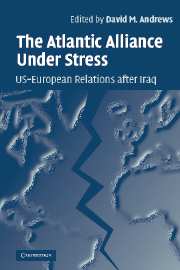References
Published online by Cambridge University Press: 22 September 2009
- Type
- Chapter
- Information
- The Atlantic Alliance Under StressUS-European Relations after Iraq, pp. 267 - 281Publisher: Cambridge University PressPrint publication year: 2005



